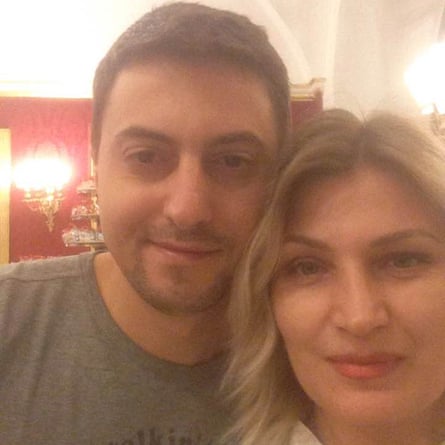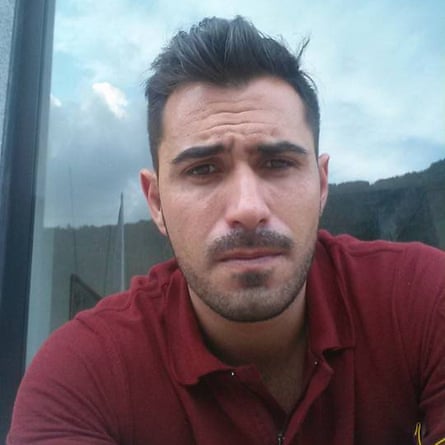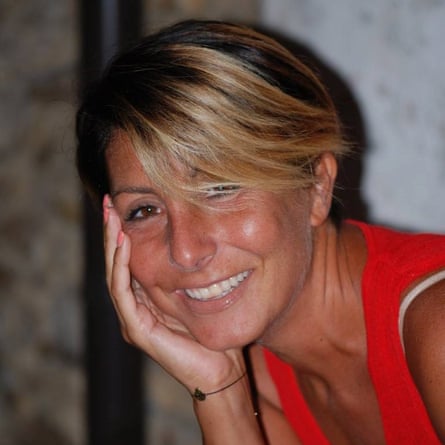With heavy rain pounding the roof of their car, Nataliya Yelina and her fiance, Eugeniu Babin, felt the sensation of Genoa’s Morandi bridge rising as they drove across it, as if they were on a drawbridge. Then, all of a sudden, they plummeted.
The couple are among the 16 people who survived when a huge span of the bridge collapsed on 14 August, the day before a national holiday. It was one of the worst tragedies in modern Italian history: 43 people were killed, the youngest, eight-year-old Samuele Robbiano.
Yelina, 44, thought about her own son, from a previous relationship, during the agonising four hours the couple were trapped upside down in their car, rubble heaped upon it. Petrified that they wouldn’t be found, they screamed and blasted the horn until the battery died. Yelina was aware that she was losing blood and fought hard to retain her strength. All the while, she could hear her mobile phone ringing, later discovering the repeated calls were from her son. They could also hear the sound of helicopters, fire engines and voices.
“We thought we would die under the bridge,” says Yelina.

Their cries for help were finally heard as rescuers saved a man from a car that was suspended above them. They were pulled out of the wreckage and taken to hospital in Genoa, where they both underwent several operations for severe neck injuries and other wounds before being discharged in September.
During their stay in hospital, the couple were euphoric – posting a video on Facebook letting their friends and relatives know that they were fine and announcing they would marry straight away. But as the physical pain began to subside, the mental torment took hold. “When your body hurts, you only think about that and wait for the pain to go. But now that we can reflect a little more, obstacles emerge – for example, when there’s rain and lightning, like there was on that day, you are hit with a fear that everything around you will collapse.”
The couple, who live in Santa Maria Capua Vetere, a town near Naples in Italy’s southern Campania region, had been making their way to Provence, in the south of France, that day in August. They had recently opened a hairdressing and beauty salon, with Babin cutting hair and Yelina running the beauty parlour. They had also just bought a home, so it was their first holiday in some time. A vivacious pair, they had previously travelled the world and were involved in a local theatre group.
“I was always such a strong and positive person, but right now I don’t have the mental strength to return to work,” Yelina says. “My job requires being upbeat. You can’t be depressed in front of customers, otherwise nobody would come.”
Despite still needing physical therapy, Babin resumed work in order to maintain the business and help the pair survive financially. As the couple are self-employed, they had no sick pay and no help with their taxes or mortgage payments while they were in hospital.
“Of course, we are happy to be alive, but it’s only now that we’re paying the real consequences,” says Yelina.

Four months on, their fellow survivors also speak about the psychological trauma they have been through. Davide Capello, 34, a former professional footballer, had driven out of a tunnel and on to the bridge when he heard a deafening sound. He had been on his way to Genoa to buy tickets for a football match.
Visibility was poor, but ahead of him he saw two or three cars disappear into a void. “I tried to slow the car down to avoid falling,” he says. Then, his car plummeted 30 metres (110ft) over the edge, along with huge blocks of concrete. He was freefalling, until he smashed into a pile of rubble. His car was a mangled wreck, but Capello was the luckiest of the survivors, emerging from the ordeal with hardly a scratch. “I didn’t even lose any blood,” he says. “But when I saw that the bridge was gone, I went into shock. I couldn’t grasp what had happened.”
Capello has worked as a firefighter since retiring from football and says it was his line of work that helped him to maintain his strength before being rescued. He called the emergency services straight away and knew which injuries to check for.
He recently returned to work, but struggles to sleep and has nightmares. “Life has definitely changed; I’m not the same person I was,” he says. “On the one hand, I know now what the important things in life are. But at the same time I have to live every day with the memory of the tragedy and its consequences.”
Bad weather had prevented Rita Giancristofaro and her boyfriend, Federico Cerne, from spending the day on the beach, so the holidaymakers decided to go to Genoa’s aquarium. They never made it. The couple, from the northern city of Trieste, suffered life-threatening injuries after their car fell about 50 metres (165ft) and were in hospital for almost two months. Both are still undergoing physical and psychological therapy and haven’t been able to return to work – Cerne, 34, is a massage therapist for a basketball team, while Giancristofaro, 41, manages her own estate agency. “There’s no doubt that we are fortunate to be here, but from the perspective of the psychological damage, life has changed for ever,” she says.

Demolition of what remains of the bridge, which was built in the 1960s by the engineer Riccardo Morandi, is due to begin on 15 December. The infrastructure group Atlantia, whose Autostrada unit was responsible for operating and maintaining the bridge, has set aside €350m (£310m) to cover the rebuild cost and compensate the families of those who died. Several Autostrada executives, along with some transport ministry officials, are under investigation for manslaughter.
Among the others who survived were Gianluca Ardini, who became a father a month after the tragedy. Marina Guagliata and her daughter Camilla were buried by the debris as they worked on the ecological island of Campi below the bridge. They clung to each other’s hands while waiting to be saved. Marian Roşca, a lorry driver from Romania, was initially listed as dead before being found among the injured in hospital.
The Italian prime minister, Giuseppe Conte, and president, Sergio Mattarella, visited the injured in hospital in the days after the tragedy, but since then survivors say there has been no sign of support or compensation from the government. “We’ve been abandoned, as if nothing happened,” says Yelina. “We see them [politicians] giving interviews on the television, but all they do is talk.”
Giancristafaro agrees: “From the moment we left hospital, we’ve been paying for everything – doctor’s visits, medication, therapy, the cost of moving around, as we can’t drive. It’s normal that they talk about the reconstruction and those who died, but nobody talks about us. I get calls and messages from so many journalists, but nothing from anyone official. It’s as if we had our dose of good fortune, but in reality none of us should be at this level of discomfort.”








